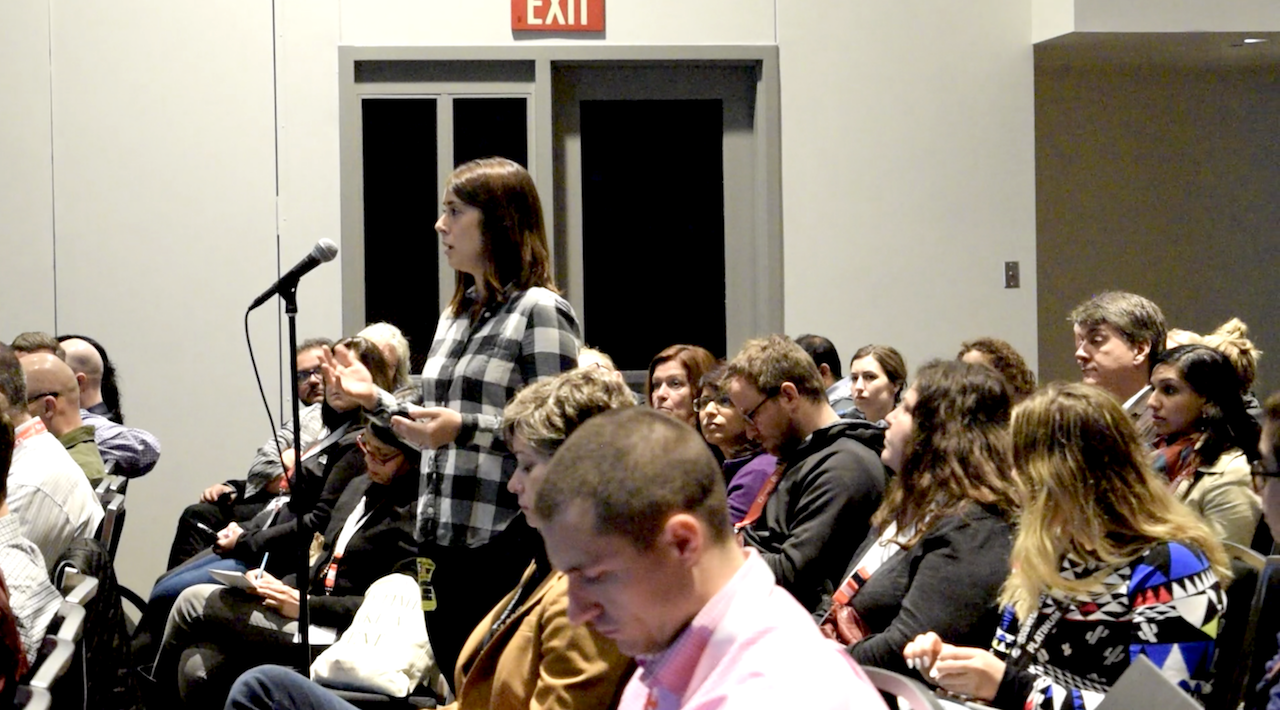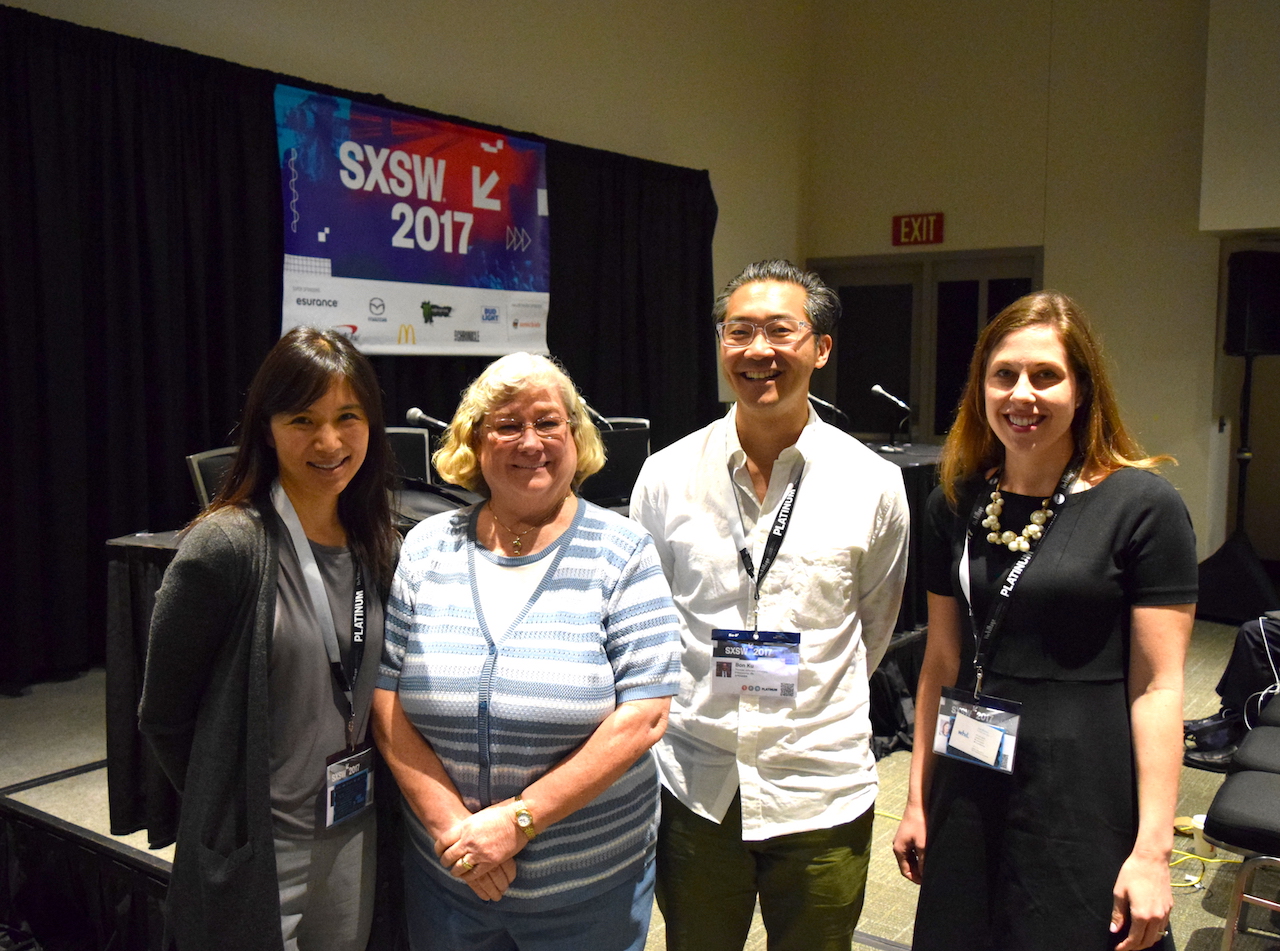A #)$%(*% Crisis: How Should We Train the Newest Generation of Docs?
By Kelly Close
.png) By Ava Runge and Kelly Close
By Ava Runge and Kelly Close
Dell Medical School’s Dr. Sue Cox leads SXSW 2017 panel on how redesigning medical education may improve diabetes care delivery
The annual South by Southwest (SXSW) 2017 conference is taking place now in Austin, Texas, where tens of thousands of attendees are gathering to explore the latest in film, music, technology, and healthcare. During the SXSW Interactive track, The diaTribe Foundation produced a panel session entitled “A #)$%(*% Crisis: Training the Newest Gen of Docs.”
The panel featured four superstar doctors from around the US, who discussed the ways in which redesigning medical education can improve physicians’ ability to tackle some of the greatest challenges in medicine – including diabetes, prediabetes, and obesity. New doctors, the panelists said, should be highly trained in communication, empathy for patients, and the business and economics of medicine. They also highlighted how training in the social determinants of health – e.g., what is happening in their community – can better equip doctors to treat patients effectively. Please see below for the top themes that emerged from the discussion, followed by notable quotes from the panelists.
Medical education has unfortunately not kept pace with societal needs, particularly in preventing and managing chronic disease. Dr. Sue Cox, Executive Vice Dean of Academics and Chair of Medical Education at the new University of Texas Dell Medical School (its first class began last summer – 55 students chosen from 4500+ applicants), highlighted several striking stats during her opening remarks: half of American adults have at least one chronic condition, and an estimated one in four have multiple chronic conditions, such as diabetes, heart disease, cancer, and arthritis. Panelists argued that the current approach to medical education is not addressing this crisis. Dr. Bon Ku, Associate Professor and Assistant Dean for Health and Design at the Thomas Jefferson University Sidney Kimmel Medical College, said that physicians are still being trained to give “sick care” rather than “health care.” Further, payment systems still incentivize treating acute conditions rather than preventing and managing chronic ones.
-
“We have a perfect storm for a crisis. Medical education has not kept up with societal needs. The competencies physicians need for the 21st century are different. And it’s no secret that the burden of chronic disease is increasing.” – Dr. Cox
-
“We have seen very little change in the curriculum. There is not enough ambulatory training, and little emphasis on the social determinants of health, reducing healthcare disparities, prevention of disease, and management of chronic disease.” - Dr. Cox
-
“I think we’ll see a major change once payment shifts from sick care to value-based care. Until now we’ve been trained to provide sick care and not to make populations healthier.” –Dr. Ku
Treating chronic disease requires acknowledging and targeting social determinants of health. Dr. Sarah Kim, an endocrinologist at Zuckerberg San Francisco General Hospital and director of the Adult Diabetes Clinic there, emphasized that many common chronic diseases are profoundly influenced by social determinants of health, yet students don’t learn how to identify and address these determinants in medical school. Some of this, of course, is helped by nurses and community health workers that get to spend a greater amount of time with patients, but still not long enough in many cases, it seems. On a similar note, Dr. Ku said that students need more training outside of clinics and hospitals, where they can come to understand the many social, economic, and cultural factors affecting health.
-
“I’m a diabetes healthcare provider for publicly insured people, and I can tell you the reason diabetes is difficult to control for so many people is not because they have the wrong meds, but because they struggle to fill their prescriptions and to afford them. In med school we aren’t taught to think about these types of determinants of health. As we move to focus on chronic disease, it will be important to think about not just what goes on in doctors’ offices, but what happens outside as well.” – Dr. Kim
-
“Every day in the ER, I see a patient come in with high blood pressure. They either couldn’t take the medicines, couldn’t afford them, or didn’t understand why they are important. There’s a gap between writing prescriptions, which used to be enough, and getting from prescription to health. The task of this generation of physicians is going to be bridging the gap between prescription and health.” – Dr. Erin Kane of Johns Hopkins, a newly minted assistant professor there who finished her residency at Hopkins in Emergency Medicine and who attended Harvard Medical School.
Panelists made it clear that new doctors need training in collaboration, empathy, and business. In a survey of over 50 UT Austin medical students and residents, respondents emphasized these skills as the most important for future physicians. Similarly, Dr. Kane, an emergency medicine physician, underscored the value of teaching communication skills to help doctors share decision-making with patients and collaborate with broader healthcare teams. She also emphasized the need for a better understanding of value and cost in medicine to help improve outcomes – data healthcare providers don’t often get. Dr. Kim said that the most important step in building empathy is for physicians to see the world through their patients’ eyes.
-
“In the current system, it’s like if you took your car to the shop and they said they’d keep car for three days, it will cost a lot, they can’t tell me exactly how much, and it may or may not run better. That’s basically what we do in health. As an emergency room physician, I get asked about cost all the time, and I have no cost transparency. I can’t give information at all.” – Dr. Kane
-
“In terms of medical education, specific communication skills can and should be taught. For instance, motivational interviewing. I also use the teach-back method. You can actually teach medical students and residents to do this, especially if the diagnosis/instructions are important or complicated. “Can you say that back to me? Did I explain it right?” – Dr. Kane
-
“Seeing eye to eye, as a physician, is doing your best to see world through patients’ eyes. My goal for patients is to get an A1c, a marker for average glucose, under a certain threshold. 7% is standard. In some cases, however, my patients might just want to get through the work day without severe hypoglycemia.” – Dr. Kim
-
“Medical schools think there are doctors, patients, and hospitals, but there so many other huge forces in healthcare; to be equipped to make change, medical students need to understand the broader health system.” – Dr. Kane
-
“I think the physician will be more of a team player and a leader in some cases. But they will be less of a lone character who saves the day.” – Dr. Kim
Redesigning medical education can also help doctors adapt to new technologies – but even more important, it could prevent physician burnout. The panelists highlighted the potential for medical education reform to also empower doctors and other health workers, helping reduce the rampant stress and burnout of the medical profession. (Indeed, a recent journal article noted that more than half of practicing physicians in the US are burned out.) Dr. Ku advocated for shortening the time it takes for medical training and for teaching creative problem solving to help doctors better adjust to the changing healthcare system. Both Dr. Kim and Dr. Ku highlighted the value of introducing a greater focus on technology in medical school curricula to help students learn how to best leverage developments in digital health and telemedicine.
-
“It’d be interesting to start seeing a greater focus on telemedicine in medical training. It is certainly a new and different skillset to give advice via video conferencing. We are still just learning the nuts and bolts of how to do this, but incorporating it into medical education would be pretty critical.” – Dr. Kim
-
“If you include college, I spent 15 years studying to become a physician. That incubation phase is way too long; I didn’t need 15 years. I think these models that involve digital education to speed up the process can be positively disruptive.” – Dr. Ku
-
“I wish I had learned a lot more creative problem solving. We’re taught very binary solutions in medical school, and we don’t do well with ambiguity, but a lot of events in healthcare don’t have binary solutions.” – Dr. Ku
Above: Dr. Sue Cox with first-year medical students from Dell Medical School
Above: Panelists at the Next Gen Docs Panel [left to right: Dr. Sarah Kim, Dr. Sue Cox, Dr. Bon Ku, and Dr. Erin Kane]

.JPG)
.JPG)







